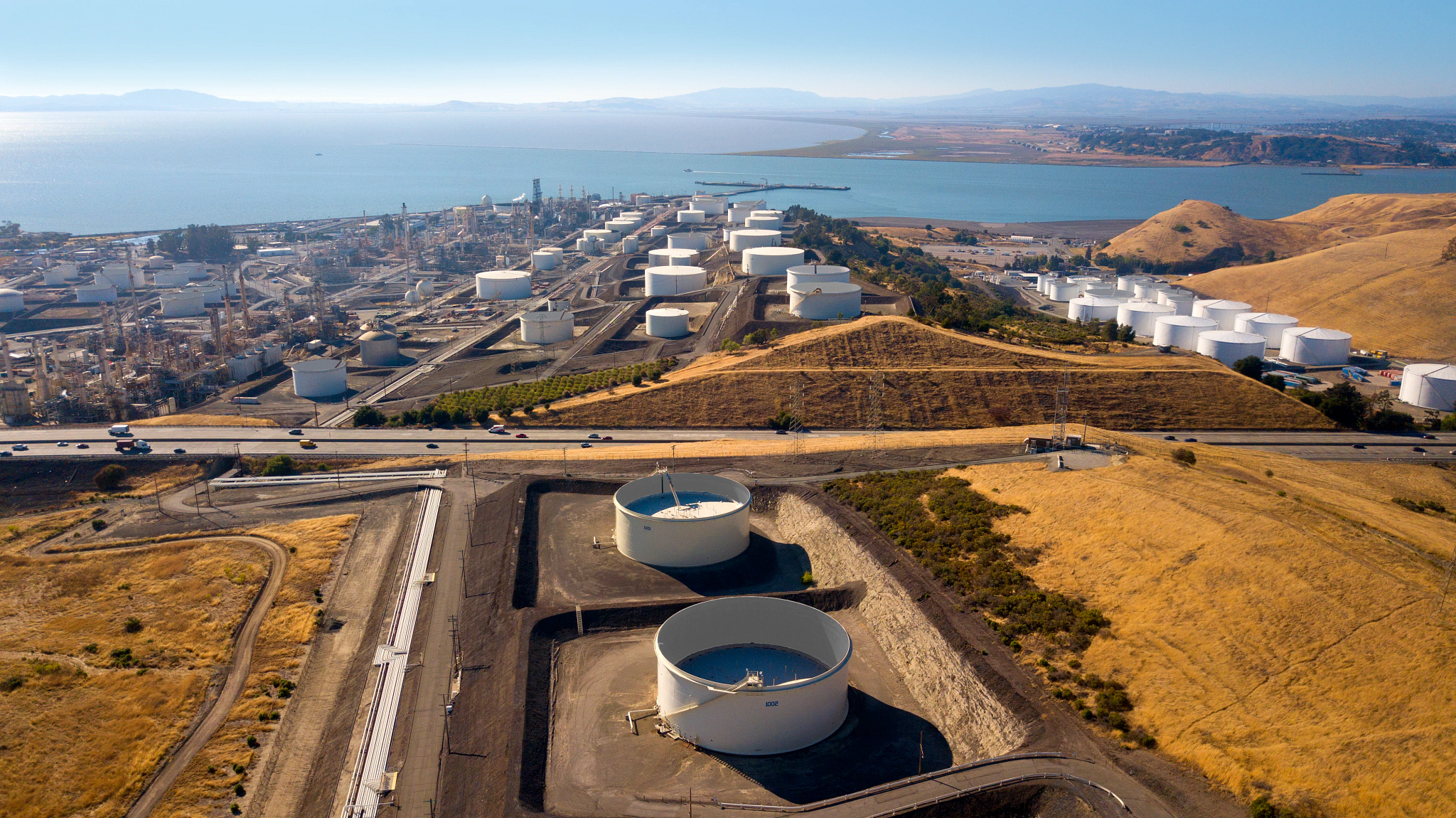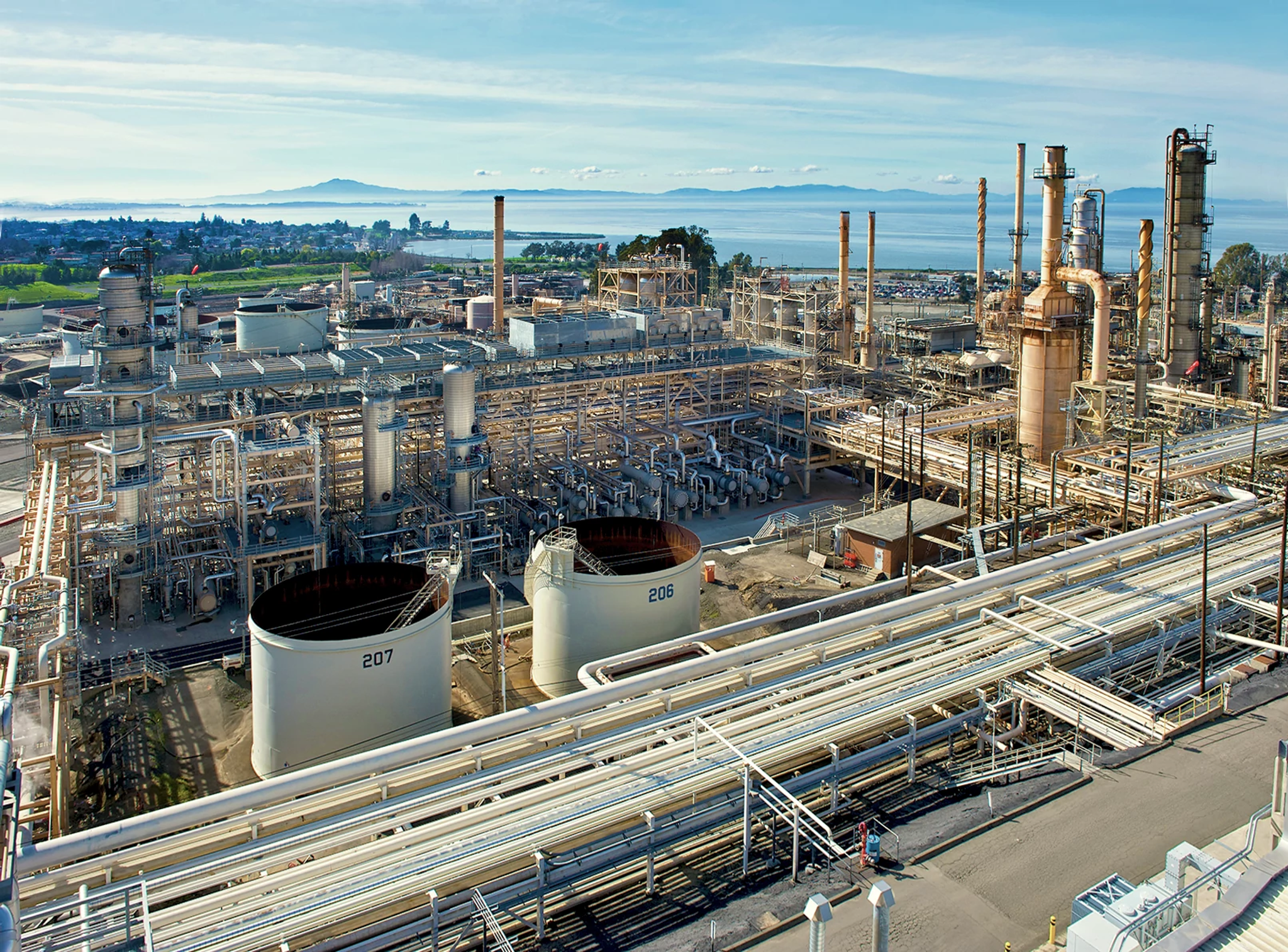
Phillips 66 refinery on highway 80.
The shift away from fossil fuels could leave refineries behind, unless they make significant changes – and that is just what is proposed for two Bay Area facilities, Phillips 66 in Rodeo and Marathon Oil’s Martinez refinery. Both have plans for remodeling their equipment and processes to eliminate using crude oil as a feedstock and create “renewable fuels” that comply with state standards for lower-carbon fuel. Phillips 66 Rodeo Renewed Project Manager Nik Weinberg-Lynn explained on KGO radio, “Our primary product is a renewable diesel. You can use it on heavy duty vehicles, agricultural vehicles, some of the ones that electrification is more long term. . . to lower the overall carbon intensity.”
While many refineries in the world now make some version of “renewable fuels”, these two facilities are leading the transition in the Bay Area. Phillips 66 has already converted one piece of equipment to making non-petroleum fuels, and plans to have the entire refinery making renewable products by 2024. Marathon’s Martinez refinery was idled in 2020 during the pandemic, but is also targeting 2024 for re-opening after remodeling to use alternative feedstocks. Both expect to make “renewable” diesel, propane and naptha. Phillips 66 has an agreement with Southwest Airlines for sustainable aviation fuel, while Marathon lists it as a possible product.
Fuels made from non-petroleum feedstocks such as soybean oil or tallow differ based on how they are processed. Biodiesel, often called “French fry” fuel because a common feedstock is used cooking oil, must be blended with conventional fossil fuels to be used in vehicles without adaptations. In contrast, the alternative fuels which would be produced by these two refineries are what Weinberg-Lynn calls “drop-in” fuels, allowing vehicles to run on them without making equipment changes or seeing any difference in operation.

Refinery pipeworks.
Although the primary function of both facilities after conversion will be the alternative-source fuels production, both will also receive and distribute some conventional fossil fuel products for the foreseeable future. For this reason, and because they will continue as major industrial operations, many of the same regulations will continue to apply to the new facility operations.
To illustrate this, the Bay Area Air Quality Management District recently revised all of its definitions relating to refineries to cover facilities using alternative feedstocks. Given the major impact on air quality from refineries, a major consideration with any change in feedstock is emissions. Chris Crowley, Principal Air Quality Specialist, presented the changes to the Air District board as maintaining the status quo, by ensuring that “a refinery which chooses to change their feedstock from petroleum-based to non-petroleum-based continues to comply with the same emissions standards and requirements as is currently required.”
Some emissions reductions should be expected because neither refinery will be processing as much fuel as before. Phillips 66’s production of renewable fuel will be just over half of current output, while Marathon’s output will drop to 36 percent of its 5-year average. Combined with the switch away from fossil-fuel feedstocks, all pollutant categories, especially sulfur compounds, are projected to decrease from previous operating levels.
The two refinery projects could lead the way to lower carbon-intensity fuels and reduced air emissions in the region. However, they are not yet approved. Draft Environmental Impact Reports (DEIRs) prepared for Phillips 66 and Marathon reflect the many concerns that have been raised, from changes in ship, truck and rail traffic to the impact of directing large quantities of oils, fats and greases into refining rather than food or other uses. Comments on both DEIRs are open until December 17, 2021.

